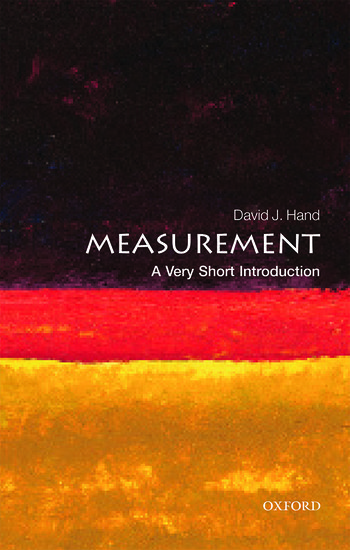Home >
A Very Short Introduction >
Measurement (Science)
A Very Short Introduction | Science
Measurement
ISBN: 9780198779568
Series: A Very Short Introduction
Measurement (Science)
A Very Short Introduction Measurement (Science) Media > Books > Non-Fiction > Education Books Expect Delays of Up to 4 Weeks| Order Below |
ISBN
9780198779568 (10-digit ISBN: 0198779569)
- Description
- Key Features
- Series Description
- Table of Contents
- Explains the basic mathematical framework behind measurement
- Provides a brief account of the history of units and measurement
- Examines the application of measurement in the physical and life sciences, medicine, social and behavioural sciences, economics, commerce, and public policy
Measurement is a fundamental concept that underpins almost every aspect of the modern world. It is central to the sciences, social sciences, medicine, and economics, but it affects everyday life. We measure everything - from the distance of far-off galaxies to the temperature of the air, levels of risk, political majorities, taxes, blood pressure, IQ, and weight. The history of measurement goes back to the ancient world, and its story has been one of gradual standardization. Today there are different types of measurement, levels of accuracy, and systems of units, applied in different contexts. Measurement involves notions of variability, accuracy, reliability, and error, and challenges such as the measurement of extreme values.In this Very Short Introduction, David Hand explains the common mathematical framework underlying all measurement, the main approaches to measurement, and the challenges involved. Following a brief historical account of measurement, he discusses measurement as used in the physical sciences and engineering, the life sciences and medicine, the social and behavioural sciences, economics, business, and public policy.
Oxford's Very Short Introductions series offers concise and original introductions to a wide range of subjects--from Islam to Sociology, Politics to Classics, Literary Theory to History, and Archaeology to the Bible.
Not simply a textbook of definitions, each volume in this series provides trenchant and provocative--yet always balanced and complete--discussions of the central issues in a given discipline or field. Every Very Short Introduction gives a readable evolution of the subject in question, demonstrating how the subject has developed and how it has influenced society. Eventually, the series will encompass every major academic discipline, offering all students an accessible and abundant reference library.
Whatever the area of study that one deems important or appealing, whatever the topic that fascinates the general reader, the Very Short Introductions series has a handy and affordable guide that will likely prove indispensable.
Please note: As this series is not ELT material, these titles are not subject to discount.
1: A brief history
2: What is measurement?
3: Measurement in the physical sciences and engineering
4: Measurement in the life sciences, medicine, and health
5: Measurement in the behavioural sciences
6: Social sciences, economics, business, and public policy
7: And beyond
References
Further Reading
Index
Measurement is a fundamental concept that underpins almost every aspect of the modern world. It is central to the sciences, social sciences, medicine, and economics, but it affects everyday life. We measure everything - from the distance of far-off galaxies to the temperature of the air, levels of risk, political majorities, taxes, blood pressure, IQ, and weight. The history of measurement goes back to the ancient world, and its story has been one of gradual standardization. Today there are different types of measurement, levels of accuracy, and systems of units, applied in different contexts. Measurement involves notions of variability, accuracy, reliability, and error, and challenges such as the measurement of extreme values.In this Very Short Introduction, David Hand explains the common mathematical framework underlying all measurement, the main approaches to measurement, and the challenges involved. Following a brief historical account of measurement, he discusses measurement as used in the physical sciences and engineering, the life sciences and medicine, the social and behavioural sciences, economics, business, and public policy.
Key Features
- Explains the basic mathematical framework behind measurement
- Provides a brief account of the history of units and measurement
- Examines the application of measurement in the physical and life sciences, medicine, social and behavioural sciences, economics, commerce, and public policy
Series Description
Oxford's Very Short Introductions series offers concise and original introductions to a wide range of subjects--from Islam to Sociology, Politics to Classics, Literary Theory to History, and Archaeology to the Bible.
Not simply a textbook of definitions, each volume in this series provides trenchant and provocative--yet always balanced and complete--discussions of the central issues in a given discipline or field. Every Very Short Introduction gives a readable evolution of the subject in question, demonstrating how the subject has developed and how it has influenced society. Eventually, the series will encompass every major academic discipline, offering all students an accessible and abundant reference library.
Whatever the area of study that one deems important or appealing, whatever the topic that fascinates the general reader, the Very Short Introductions series has a handy and affordable guide that will likely prove indispensable.
Please note: As this series is not ELT material, these titles are not subject to discount.
EASY ORDER FORM
PRICES LISTED INCLUDE CONSUMPTION TAX
Price Before Tax:
¥1,790


